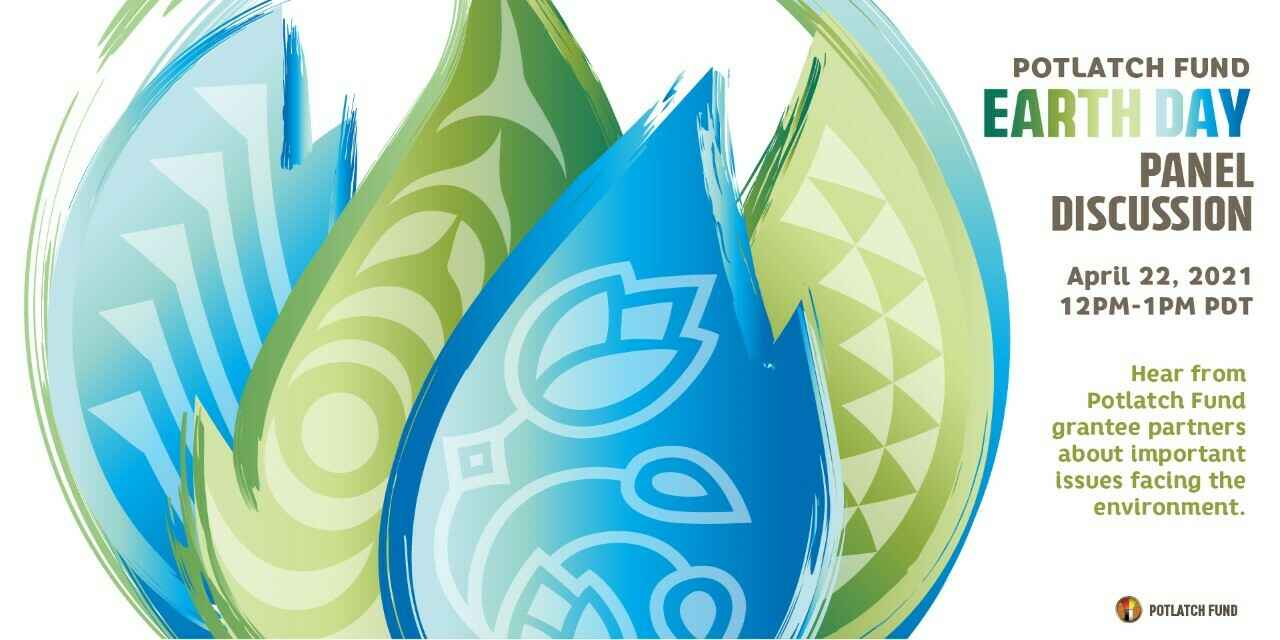Potlatch Fund Earth Day Panel Discussion
April 22, 2021 @ 12:00PM — 1:00PM Pacific Time (US & Canada)
Hear from Potlatch Fund grant recipients about important issues facing the environment

Our panel discussion will talk about the most important issues facing Indigenous communities and our environment. Learn from our grant recipients on how you can help protect Mother Earth in your community. Come join us Thursday April 22, at 12pm PST for a luncheon panel discussion with Potlatch Fund grant recipients Nimiipuu Protecting the Environment, Lower Elwha Klallam Tribe, Yellow Bird and Na’ah Illahee Fund, moderated by Pah-tu Pitt.
Pah-tu Pitt
Pah-tu Pitt G. (Warm Springs/Wasco), she/her/they/them, focuses on advocacy for Indigenous climate change resiliency, sustainable economic development, and resourcing grassroots efforts within the Pacific Northwest. They hold a degree in Environmental Science from Portland State University and a Master of Environmental Studies from Evergreen State. As a Native Kut business owner, she practices art, consulting, and runs a vacation/business rental that is Native art themed. Her work draws on the desire to re-center feminine leadership and to bring visibility to the experiences of historically impacted communities.
Susan Balbas (Cherokee/Yaqui), Na’ah Illahee Fund
Co-founder and Executive Director, community organizer, Susan holds a Bachelor of Business Administration and a Master of Science in Teaching. Ms. Balbas carries valuable expertise in all levels of nonprofit operations and management. She was a national training and technical assistance specialist for multiple tribal youth programs for the U.S. Department of Justice’s Tribal Youth Programs through Education Development Center. Susan has been an independent consultant working with tribes, artists and nonprofit organizations, the Chief Development Officer at United Indians of All Tribes Foundation in Seattle, Development and Donor Education Coordinator at Changemakers Foundation in San Francisco, Executive Director at the NAYA Youth and Family Center in Portland, Outreach Director at the Western Water Alliance in Seattle where she was the primary researcher on water and related environmental issues. Mother of three and grandmother of three, Susan has studied extensively with herbalists, is an avid gardener, cook, and a voracious reader of historical novels. She currently serves on the boards of Front & Centered, Washington Progress Alliance and the Potlatch Fund in Seattle.
Lower Elwha Klallam Tribe
The Lower Elwha Klallam Tribe is a sovereign, federally recognized Indian Nation, with its own constitution and government. Not only does the Tribe govern itself, but many Tribal administrative departments oversee the everyday function of the reservation and provide for Tribal members.
The Lower Elwha Klallam Tribe resides in the Lower Elwha River Valley and adjacent bluffs on the north coast of the Olympic Peninsula just west of Port Angeles, Washington. As recognized by the United States in 1855’s Treaty of Point No Point, the Tribe has lived in this area since time immemorial.
The Tribe’s current landbase was initially acquired by the United States in trust for the Tribe in 1935-36 and these lands were proclaimed as the Lower Elwha Reservation in 1968. Today tribal lands include about 1,000 acres on and near the Elwha River.
Julian Matthews (Nez Perce) and Lucinda Simpson (Nooksack/Nez Perce), Nimiipuu Protecting the Environment
Nimiipuu is the English translation for “the people” which is one amongst many names the Nez Perce call ourselves. And- protecting the environment of our traditional lands was the common committment that brought us together.
We began organizing a number of years ago as a volunteer group concerned about protecting our traditional rights and lands. Then, after the Exxon Mobil Megaloads protests by our tribal members in 2013, we began to meet on a regular basis.
By networking with some First Nations friends near the Tar Sands, we had the opportunity to meet and receive financial support from the Seventh Generation Fund. With their seed funding, we began working on ways to educate and inform our tribal membership about the Tar Sands and other areas at risk. We began meeting, organizing activities and events on the reservation, and offering public interest group activities at area colleges/universities.
Nimiipuu Protecting the Environment is committed to protect Tribal Treaty rights within our original ceded area and usual and accustomed places.
Yellow Bird
Yellow Bird, is a non-profit organization, founded by Phillip Whiteman Jr. Northern Cheyenne Traditional Chief and Lynette Two Bulls, Oglala Lakota who is also the Executive Director. We are located on the beautiful Northern Cheyenne Homelands in Southeastern Montana. At the core of our organization are the youth and elders. These two age groups are crucial because they represent the future and the wisdom needed to carry on. We are comprised of a youth and elder advisory council and depend on volunteers for our programs.
We were honored to be an affiliate of Seventh Generation Fund for Indigenous Peoples, for ten years who provided technical support and fiscal management. Now, Yellow Bird its own 501c3 Non Profit Organization, continues to expand, grow and continues to deeply impact the community.
Yellow Bird was founded on the traditional principals of “reciprocity” and “giving back” to our community. Our original programming the Annual Fort Robinson Outbreak Spiritual 400 mile Run has become a venue for addressing historical trauma, wellness and youth leadership. Now, after 20 years of youth programming; Yellow Bird has grown to include Youth Leadership & Empowerment, Arts & Culture, Food Sovereignty, Wellness, Social Justice, Environmental Justice, and Community Empowerment and Development.